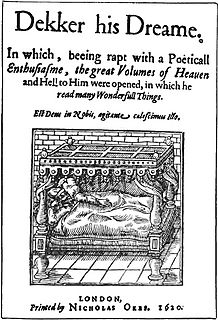Related Research Articles

Thomas Middleton was an English Jacobean playwright and poet. He, with John Fletcher and Ben Jonson, was among the most successful and prolific of playwrights at work in the Jacobean period, and among the few to gain equal success in comedy and tragedy. He was also a prolific writer of masques and pageants.

Philip Massinger was an English dramatist. His finely plotted plays, including A New Way to Pay Old Debts, The City Madam, and The Roman Actor, are noted for their satire and realism, and their political and social themes.

Thomas Dekker was an English Elizabethan dramatist and pamphleteer, a versatile and prolific writer, whose career spanned several decades and brought him into contact with many of the period's most famous dramatists.

John Ford was an English playwright and poet of the Jacobean and Caroline eras born in Ilsington in Devon, England. His plays deal mainly with the conflict between passion and conscience. Although remembered primarily as a playwright, he wrote a number of other poems on themes of love and morality.
Thomas Randolph was an English poet and dramatist, recognised by his mentor Ben Jonson as being a promising writer of comedy, and amongst his contemporaries had a reputation as a wit.

The Merry Devil of Edmonton is an Elizabethan-era stage play; a comedy about a magician, Peter Fabell, nicknamed the Merry Devil. It was at one point attributed to William Shakespeare, but is now considered part of the Shakespeare Apocrypha.

John Warburton (1682–1759) was an antiquarian, cartographer, and Somerset Herald of Arms in Ordinary at the College of Arms in the early 18th century.
Keep the Widow Waking is a lost Jacobean play, significant chiefly for the light it throws on the complexities of collaborative authorship in English Renaissance drama.

Satiromastix, or The Untrussing of the Humorous Poet is a late Elizabethan stage play by Thomas Dekker, one of the plays involved in the Poetomachia or War of the Theatres.
A Tale of a Tub is a Caroline era stage play, a comedy written by Ben Jonson. The last of his plays to be staged during his lifetime, A Tale of a Tub was performed in 1633 and published in 1640 in the second folio of Jonson's works.
The Sun's Darling is a masque, or masque-like play, written by John Ford and Thomas Dekker, and first published in 1656.
Andromana, or The Merchant's Wife is a mid-seventeenth-century stage play, a tragedy first published in 1660. It has attracted scholarly attention for the questions of its authorship and the influence of its sources.
The Country Captain, alternatively known as Captain Underwit, is a Caroline era stage play written by William Cavendish, 1st Duke of Newcastle, and first published in 1649. It has attracted critical attention primarily for the question of James Shirley's participation in its authorship.
The Beaumont and Fletcher folios are two large folio collections of the stage plays of John Fletcher and his collaborators. The first was issued in 1647, and the second in 1679. The two collections were important in preserving many works of English Renaissance drama.
The Honest Man's Fortune is a Jacobean era stage play, a tragicomedy written by Nathan Field, John Fletcher, and Philip Massinger. It was apparently the earliest of the works produced by this trio of writers, the others being The Queen of Corinth and The Knight of Malta.
Love's Pilgrimage is a Jacobean era stage play, a tragicomedy by Francis Beaumont and John Fletcher. The play is unusual in their canon, in that its opening scene contains material from Ben Jonson's 1629 comedy The New Inn.
Edward Knight was the prompter of the King's Men, the acting company that performed the plays of William Shakespeare, Ben Jonson, John Fletcher, and other playwrights of Jacobean and Caroline drama.
The Spanish Viceroy is a problem play of English Renaissance drama. Originally a work by Philip Massinger dating from 1624, it was controversial in its own era, and may or may not exist today in altered form.
Fredson Thayer Bowers was an American bibliographer and scholar of textual editing.
References
- ↑ Terence P. Logan and Denzell S. Smith, eds., The Later Jacobean and Caroline Dramatists: A Survey and Bibliography of Recent Studies in English Renaissance Drama, Lincoln, NE, University of Nebraska Press, 1978; p. 224.
- ↑ Fredson Bowers, "Ben Jonson, Thomas Randolph, and The Drinking Academy." Notes and Queries Vol. 173 (1937), pp. 166–8.
- ↑ Fredson Thayer Bowers, ed., "The fary knight; or, Oberon the Second," a manuscript play attributed to Thomas Randolph, Chapel Hill, NC, University of North Carolina Press, 1942. (Bowers employed the archaic spelling of "fary" for "fairy.")
- ↑ Logan and Smith, p. 223.